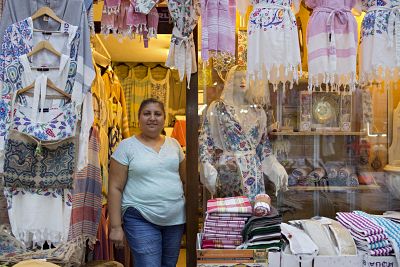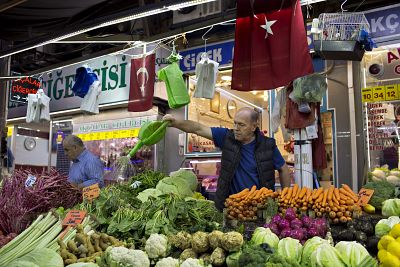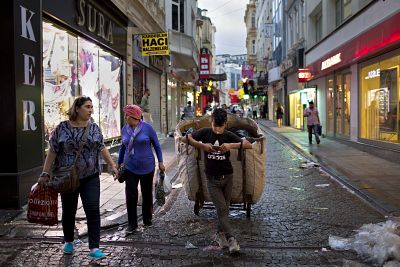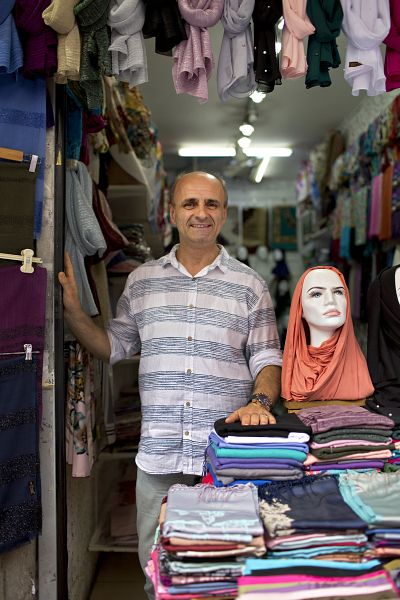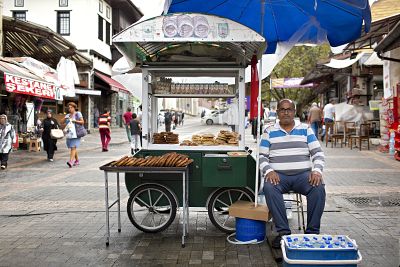The strongman has blamed White House pressure for a financial crisis that began long before this summer's spat over detained U.S. pastor Andrew Brunson.
BURSA, Turkey — In an ancient city built on money and trade, times are hard.
 ADVERTISEMENT
ADVERTISEMENT
 ADVERTISEMENT
ADVERTISEMENT
Bursa, the original capital of the Ottoman Empire and Turkey's fourth-largest city, lay at the heart of the east-west Silk Road trading route.
The leaves of its abundant mulberry trees are perfect for silkworms. Its centuries-old markets are piled high with pungent spices, fresh fruit and vegetables and locally produced clothes and linens.
While traders call out their prices, shoppers are not in a rush to buy.
Soaring inflation and a weak currency, followed by a punishing hike in U.S. tariffs aimed at securing the freedom of jailed North Carolina pastor Andrew Brunson, have driven up costs, leaving many everyday items unaffordable.
"I make the same amount of money as I did last year, but the price of everything has gone up," said Pembe Cavdar, 52, as she waited for customers at her textiles store in Bursa's bazaar. "After I buy food and pay the electricity there is nothing left."
President Donald Trump last month imposed sanctions on two Turkish ministers and doubled the rate of import tariffs on Turkish metals in a diplomatic rift over the jailing of Americans including Brunson.
But instead of making President Recep Tayyip Erdogan less popular with Turks, the White House appears to have provided an excuse for the financial turmoil.
By characterizing his country's predicament as "an attempted economic assassination" by America, Erdogan has shifted the blame for a crisis that began long before this summer's spat.
"Trump made a mistake," said olive trader Murat Demirer, 25. "Every time America tries to hurt us, hurt our economy, we will get stronger."
'Everybody has less money'
Bursa has benefited from Erdogan's strategy of ambitious growth and grand public infrastructure projects financed through cheap debt. The 8,800-foot-long, $1.3 billion Osmangazi Bridge — the fourth-largest suspension structure in the world — slashed the highway journey from Istanbul by one-third when it opened in 2016 to just two hours and 100 miles.
Still, weary residents are grappling with annual inflation of nearly 18 percent, official statistics showed this month — the highest rate in more than 15 years.
“This crisis is totally the fault of Erdogan but he blames America and people believe him.”
The cost of everything, from tomatoes to toys, from sugar to schoolbooks, is rapidly rising. Imported items have been hit the worst, thanks to a 40 percent slump in the value of the Turkish lira against the U.S. dollar since the start of the year.
"Bananas have risen the most," said Emin Celekoglu, 30, a fruit seller. "Customers are choosing different things in order to keep their costs down."
At the start of the year, he said, 100 lira would buy his weekly groceries and household supplies; now, the same basket of goods costs him 180-200 lira a week. But his income remains unchanged.
"Everybody has less money than before and the cost of benzine means the price of transporting things is also much higher," Celekoglu said, referring to the ubiquitous fuel.
In Bursa's market cafes, a typical kahvalti — the traditional Turkish spread of boiled eggs, cheese, bread, omelet, olives and tomatoes — is now 15 lira, up from 8 last year.
Nor can Turks drown their financial sorrows: A bottle of raki liquor now costs 100 lira, up from 70 lira. And when the price of toilet paper doubled this month (Turkey's last paper mill closed a decade ago, leaving it reliant on imports) the hashtag #TuvaletKağıdı60TLOldu(toilet paper is 60 TL) was trending as social media users resorted to humor.
The value of outstanding loans in foreign currency surged 7.8 percent from Aug. 20 to Aug. 31, crippling many businesses, including some of Bursa's stallholders who pay their rent or wages in dollars.
On Monday, the government relaxed regulations to ease the burden on banks, and banned property sales and rent in foreign currency, but it was not enough to prevent the country's oldest shoemaker from seeking bankruptcy protection the following day. On Wednesday, it slashed growth forecasts for 2019 from 5.5 percent to 2.3 percent.
Since gaining expanded executive powers in July, Erdogan has tightened his grip on the economy and monetary policy, appointing his son-in-law, Berat Albayrak, as finance minister and taking charge of Turkey's sovereign wealth fund.
Turkey
Taking full advantage of his extensive control of the media — in particular, television channels — Erdogan has engaged Turks in what he calls an economic war with America, framing U.S. sanctions as an attack on all of Turkey rather than just its government.
"An attack on our economy is no different from a direct strike against our flag and call to prayer," Erdogan said last month. He has also called on consumers to boycott American imports such as iPhones.
His message has found support in a country that has grown used to his Trump-style economic nationalism — to the despair of his critics.
"This crisis is totally the fault of Erdogan, but he blames America and people believe him," said a 70-year-old retired teacher who gave her name as Muzeyyen. "Erdogan is just like Trump — he tells people what they want to hear."
On a fixed retirement pension but facing rising food prices, she said she would save money by not buying new clothes until the economy improves.
Former lawmaker Baris Yarkadaş, who is now spokesman for the opposition CHP party, said Turkey's crisis was caused by out-of-control government spending on construction contracts that mainly benefit Erdogan's allies.
"This investment is only to make money for his family or friends," he said. "If you look at the media, there is no sign of a crisis, but when people started to feel the crisis for themselves, Erdogan made an issue of this priest, Brunson."
World news
Some Turks don't know who to believe.
"America is hurting us," said Celekoglu, the fruit seller. But when asked about Erdogan, he replied, "They are both wrong."
Brighter spots
It isn't bad news all round.
While cities like Bursa struggle, Turkey's Mediterranean coastal resorts have enjoyed a record-setting summer as sun-seeking vacationers took advantage of the weak lira. Hotels in the southern cities of Antalya and Bodrum reported near total occupancy.
Turkey's exports were also in a strong position before the White House sanctions and tariffs; machinery exports reached $11 billion in the first eight months of 2018, while steel exports rose 5.8 percent.
In Istanbul's Grand Bazaar, where tourists outnumber local shoppers, there was less pessimism about the economy.
Mehmet, 17, a stall helper who was counting a fistful of U.S. dollars outside a currency exchange store, said his only problem was keeping abreast of fluctuating rates.
"Some people buy from us in dollars," he said. "If we pick the wrong day to change the money, we get a lot less."
Abdulselam Emir, 37, who sells textiles, said his income was significantly lower than last year, squeezed by the rising cost of materials such as cotton. "These cushion covers are 30 lira each. Two months ago they were only 15," he said.
But another trader, Sunay Alo, 47, said he did not believe there was a widespread crisis.
"I do not trust those who say there is a crisis," he said. "Look at all these people, look at all the money they are spending. The only problem is the U.S. dollar, and we are strong enough to deal with that."
There was a similarly sanguine view from Suat Alkazan, 56, who runs a cart in Bursa selling simit — Turkey's ubiquitous pretzel-like snacks. Earlier this year, each simit was 1 lira but now they cost a lira and a half, he said, because of the rising cost of the sesame seeds used as a coating.
"But look, people are still buying," he said. "We will never have a simit crisis. Turkish people like their food too much."











